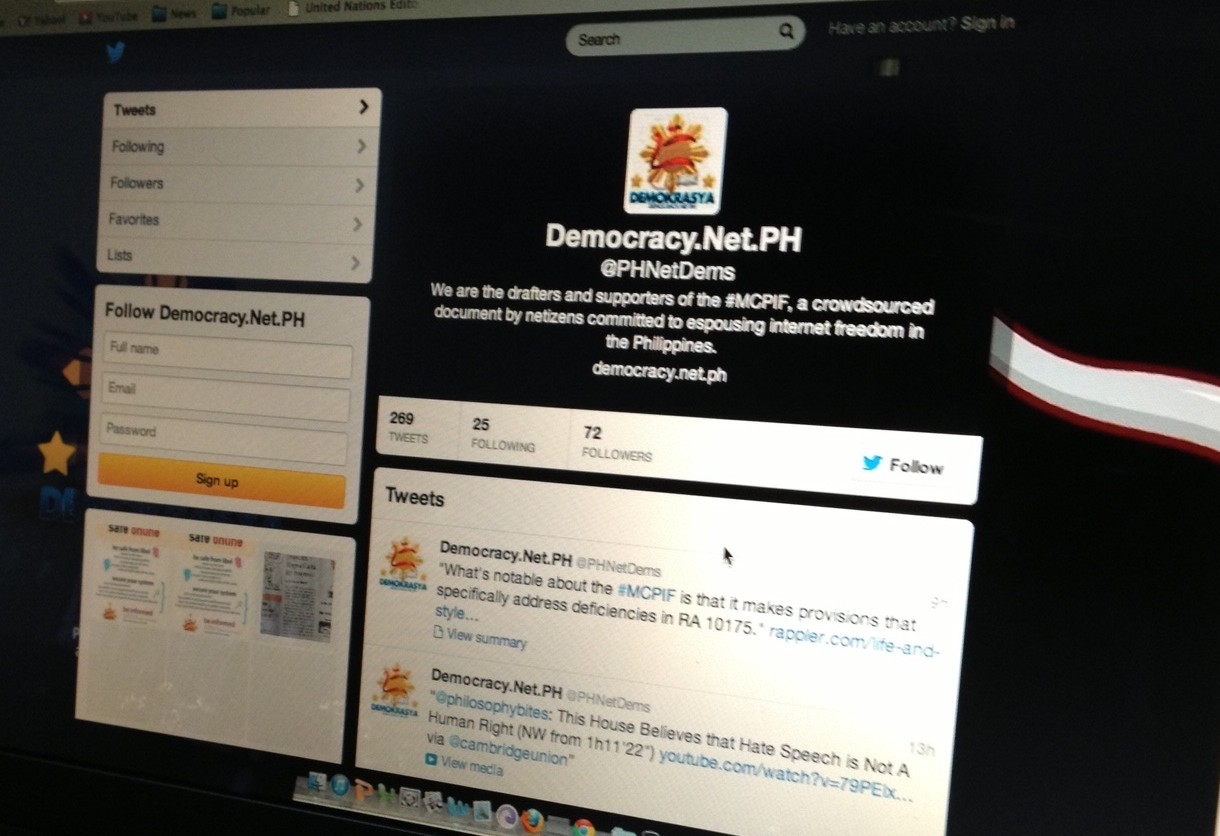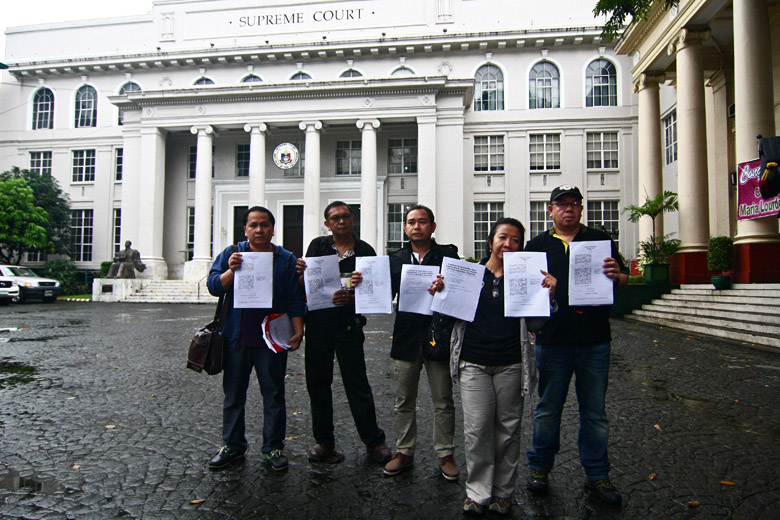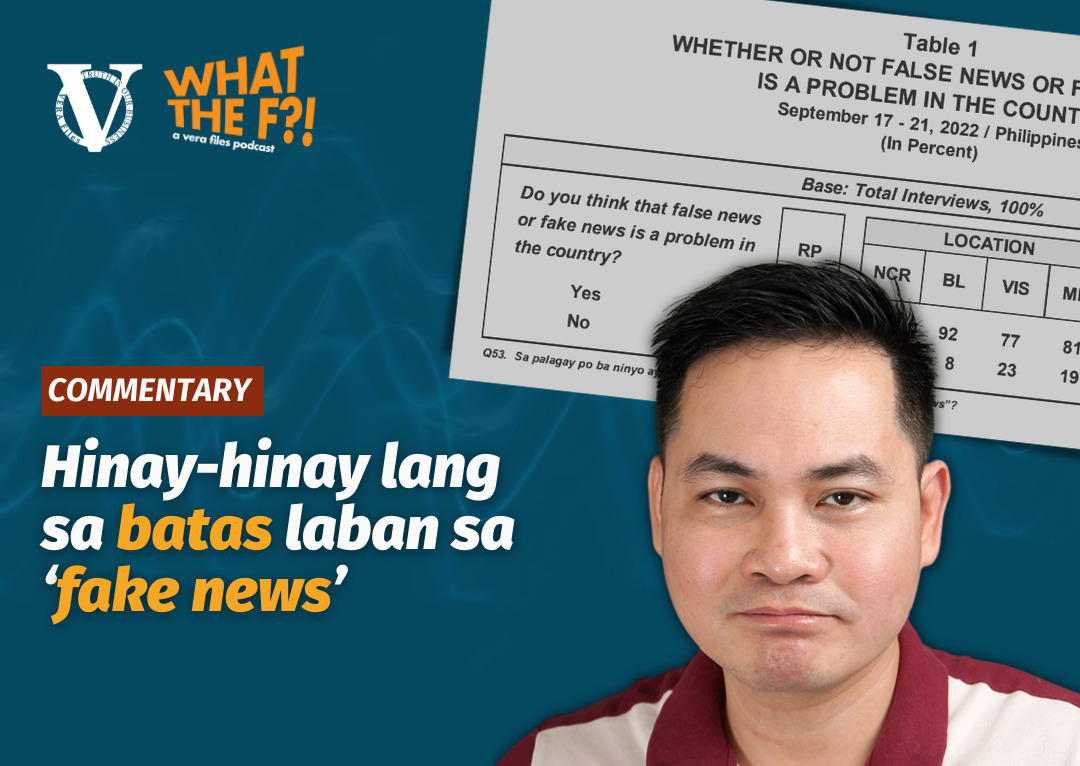By JONATHAN DE SANTOS
ACTIVISTS troop to the Supreme Court tomorrow, the second time they will do so this month, to oppose the Cybercrime Prevention Act of 2012. But another group has been working quietly towards much the same goal: a repeal of the law that critics say will violate the freedoms of speech and expression.
The group calls itself Democracy.net.PH or PHNetDems for short, and is taking the lead in helping draft the country’s first ever crowd-sourced piece of legislation.
That draft is the Magna Carta for Philippine Internet Freedom (MCPIF) which Senator Miriam Defensor-Santiago filed as a Senate bill in November 2012. Although unprecedented, PHNetDems’ work was done through official channels, in the open and on online platforms that anybody could access.
Little is known about the PHNetDems because it has not done anything controversial, unlike the group Anonymous Philippines which chooses to hide its members identities yet takes credit for defacing government websites to protest the Anti-Cybercrime law.
Kabataan party-list, one of the groups seeking a repeal of the Cybercrime Prevention Act, promised in a press release to hold “a nationwide protest, (through which) the youth will show the Aquino regime our vehement opposition to his E-Martial Law.” Last week, they held a vigil in front of the Supreme Court for the first round of oral arguments on the Anti-Cybercrime Law complete with elaborate props and costumes.
In contrast, the PHNetDems promise legislation to replace the Cybercrime Prevention Act, the process of which will be neither flashy nor quick.
The PHNetDems are not the only ones who have proposed changes to the supposedly oppressive law. Kabataan party-list, through Representative Raymond Palatino, and Bayan Muna party-list Rep. Teddy Casino have filed a bill to repeal provisions of the Anti-Cybercrime Law, among them a provision for a higher punishment for libel made online.
Senator Francis Escudero, chairman of the Senate committee on justice and human rights, has also filed a bill to remove the libel provision in the Anti-Cybercrime Law.
The PHNetDems believe, however, that repealing parts of the law is not enough. Pierre Tito Galla, an engineer and member of the PHNetDems, told VERA Files “the approach to a national ICT policy should be holistic, not piecemeal.”
Lawmaking through consensus
Since lawmakers and policymakers were not doing enough to reach out to their constituents, the PHNetDems, an informal group with over several hundred members,” decided to draft a proposed law themselves.
“I think it’s possible that the lawmakers were not able to communicate adequately to the public the need for inputs for such a far-reaching law. Had the lawmakers been more active in reaching out to stakeholders who are well-versed in…then perhaps RA 10175 would not have been crafted so shoddily,” Galla says.
Although Senator Teofisto Guingona III has already filed a Crowdsourcing bill that will allow citizens to provide feedback on pending legislation through the Internet, that remains a proposal. The PHNetDems decided to go ahead and do it anyway.
Because of the informal nature of crowdsourcing, the group “exercised rough consensus as much as possible. Decisions for example, are crowd-sourced, although time-limited. We take as much input as we can, form our rough consensus, and implement as soon as feasible.”
“The beauty of crowdsourcing is that people give effort so much so that things get done in time for when things are needed, whether it be content to fill up or setting up meetings with other people,” Galla says.
With so many people working on the draft of the MCPIF, Galla says the work on the bill was thorough, and with polishing and staff work by the the Office of Senator Miriam Defensor-Santiago, Senate Bill 3327 is one of the easiest-to-read bills at the Senate. It even has a table of contents.
The Magna Carta for Philippine Internet Freedom
Where the Cybercrime Prevention Act tries to apply the elements of libel to statements made on the Internet, the MCPIF recognizes that the Internet is too complex for a law meant for newspapers.
“The Magna Carta for Philippine Internet Freedom goes beyond the scope of RA 10175 simply because the Cybercrime Prevention Act is inadequate and ill suited to address the challenges of the Information Age,” Galla says.
Although the MCPIF does not mean to remove liability for libelous statements made online, it seeks exceptions for the legitimate airing of grievances.
Under the proposed MCPIF, expressions of protest and dissatisfaction against the government or of non-government organizations do not count as online libel. Neither do expressions of dissatisfaction with a product, or those that are meant to discredit a product. Statements meant to be private, like those sent through direct messages, cannot be considered libelous either, even if they are later made public.
The proposed law will also protect bloggers and writers who publish “a fair and true report, made in good faith, without any comments or remarks, of any judicial, legislative or other official proceedings, or of any statement, report or speech delivered in said proceedings, or of any other act performed by public officers in the exercise of their functions, or of any matter of public interest.”
Under the MCPIF, truth is a defense against libel. Satire is also a defense, since posts meant to be funny and satirical are protected by the MCPIF.
Although netizens can still be charged with Internet libel, complainants will need to show the posts or messages were done with malice and that the supposedly libelous statements referred to them.
There is no libel if the statement “does not explicitly identify the person who is the subject of the expression, except if the content of the expression is sufficient for positive and unequivocal identification of the subject of the expression.”
The MCPIF also revokes the authority that the Cybercrime Prevention Act gives the Department of Justice to take down websites and networks. If passed into law, only a court order can compel the removal of material that “creates a clear and present danger of a substantive evil that the state has a right or duty to prevent.”
Crowd-sourcing Governance
Because of the unique aspects of cybercrime, the MCPIF also seeks to create cybercrime courts in cities and towns. These courts will have to be presided over by judges who are “competent in matters related to the Internet and information and communications technology.”
But the MCPIF goes beyond cybercrime since it is meant to be the country’s ICT framework. Among the provisions of proposed law requires that telecommunications companies and Internet service providers give quality service. This includes the timely correction of billing errors and giving consumers “in plain language, accurate information concerning any terms, conditions, or limitations on the network service.”
The bill also pushes for universal access to the Internet, specifically stating that corporations, schools, and establishments “by whose nature there is a reasonable expectation of Internet access” cannot restrict access to the Internet without reasonable grounds. Unless granting unrestricted access endangers the privacy of those on the network, the public Internet should remain free, Democracy.net.PH says.
The MCPIF still has far to go before it becomes a law, if it does at all. The MCPIF will need a counterpart bill at the House of Representatives.
“We haven’t stopped trying to get in touch with legislators, of course, and we’re willing to work closely with them to get this piece of legislation passed,” Galla says.
Juned Sonido, a blogger and information specialist who is in charge of generating publicity for the bill, says he expects more critical dialogue with lawmakers both inside and outside the halls of Congress. “We expect that it will be put under scrutiny,” he says.
Reception has been more positive among netizens, though, he says. “Generally, it strikes a personal chord with people. ‘How will this affect me?’ So people from different walks of line have expressed interest,” he says.
And that is where people can help MCPIF the most. “While the Magna Carta for Philippine Internet Freedom could very well be the first crowdsourced piece of legislation in the Philippine Senate (or for that matter, of the entire Philippine legislature), there is no substitute for real work done by real people in the real world,” Galla says in a post on ProPinoy.net.
Although the bill has been filed, netizens can help get it passed through joining the PHNetDems Facebook group, (https://www.facebook.com/groups/Democracy.Net.PH/) and telling people, especially legislators about the bill.
“The crowdsourcing effort has not stopped; instead, it has moved on to the next level — that of taking online participation offline,” Galla says.



